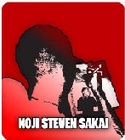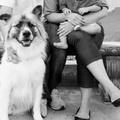I think my nisei grandfather was a spy for Japan during the Second World War. I know that’s a loaded thing to say in the Japanese American community, but the more I find out, the more certain I become of it.
Let me start from the beginning...
Over the last few years I have been doing research on my family. Specifically, what happened to us during WWII. It started when I requested my grandfather’s papers from the National Archives.
My grandfather and his family was one of only 3,000 Japanese Americans to be incarcerated from Hawaii. The reason? He was a clerk at the Japanese consulate in Honolulu. Needless to say, it was not a good place for a Japanese American to work.
My family was first sent to the Topaz, Utah concentration camp. While there, my grandfather (an American citizen) asked to be expatriated to Japan and thus became an enemy alien. He was sent to the Tule Lake, Northern California concentration camp after he answered “No, No” to the loyalty questioner.
At some point, my grandfather decided that he wanted to stay in America. They were moved to Crystal City, Texas, a Department of Justice camp, until his case was settled and he was returned to Hawaii.
On the surface, nothing too bad stands out. I mean, what happened to my family was not normal, but it also didn’t seem realistic that he could be a spy.
There are questionable things that I should mention that I did discover that gave me pause. For example, in the FBI intelligence report I found in his National Archives file, they wrote that my grandfather was "more an old time Japanese than a Hawaiian-born Japanese. He was reported to be extremely pro-Japanese and anti-American in sentiment."
According to the same document, in 1937, my grandfather and another individual seized and attempted to "manhandle" a United States photographer, who was assigned to observe the activities of a Japanese oil tanker on its visit to Hawaii.
The FBI report goes on to write that my grandfather was taken into custody by the military authorities under a warrant authorized by the Secretary of War on October 3, 1942.
...He was afforded a hearing before an Internee Hearing Board, and it was brought out while before the board that [my grandfather] while working for the consulate was suspicious of the activities of several other employees but did not divulge this information to the proper authority. He admitted that around August 1, 1941, many papers from the files of the consulate were burned, and he admitted that the clerks were paid for it and told not to tell anyone that they had been burned.
Without having spoken to my grandfather (he passed away before I was born), I always gave him the benefit of the doubt. I believed that all the charges the government made against him were made up to justify my family’s long incarceration during the war.
Maybe I just wanted to believe it wasn’t true. For the last two years, I’ve searched and searched for the records of my grandfather’s internee hearings that I hoped would exonerate him.
I still haven’t found anything, but my mother over the weekend told me something about my grandfather that has made me question his loyalty. Apparently, sometime during the late 1930s, my grandparents met privately with Hirohito, the Emperor of Japan. During this meeting, my grandmother took a picture with the Emperor and they were given a gift of jade cufflinks and a painting with his official stamp.
This in and of itself isn’t too suspicious, but when combined with what I already know about him, it made me suspect his loyalty. Why would a lowly clerk be allowed to meet with an emperor? Especially back in the 1930s when the Japanese Emperor still held political and social power. Wouldn’t a meeting with such an important person imply he was more involved than just as a clerk?
I know it’s a huge leap to think that this is definite proof that my grandfather was a spy, but it made me re-look at what I know about him and start to ask questions.
The first question that immediately came to mind was about his work at the consulate’s office: What exactly did he do there? Then I started questioning his role in the paperwork burning: Was he one of the clerks that burned the paperwork? If he was, what kind of paperwork did he burn? Did he know what he was doing or was he just following orders? And then, the two most important questions: Did he know about Pearl Harbor before it happened and not do anything about it? Or worse yet, was he somehow involved with the attack? (I don’t even want to get into the manhandling the United States photographer.)
On the other hand, it could have been completely innocent. I recently was in the same building as the Japanese crown prince and obviously wasn’t sharing state secrets with him.
I wish I could just ask my grandfather about all of this. I don’t like the idea of thinking he was a spy. I want to believe he was loyal and just made to look suspicious – it would be easier on my patriotic conscience that way.
But my gut says that there are too many questions for him to be completely innocent. I fear that I will never know the full truth either way – was he or wasn’t he a spy?
It’s amazing how much I can piece together through family stories, government documents, and pictures. It is equally amazing how little I know. This is just another reason why everyone should write an autobiography. The last thing I want is my grandchildren seventy years from now questioning my loyalty to this country.
And for them, I write this: "Your grandfather (me), despite your great great grandfather’s questionable allegiances, was a loyal man who would have served loyally in the armed forces had there been a draft and/or a real enemy to fight."
© 2008 Koji Steven Sakai






